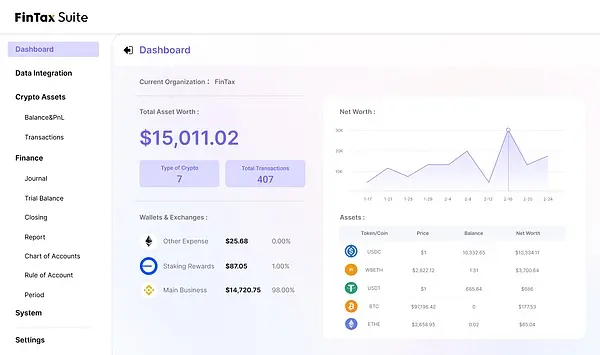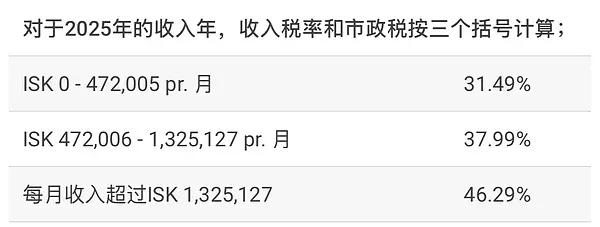Author: TaxDAO
Written by: FinTax
1. Introduction
Iceland, benefiting from its unique climate conditions and natural resource reserves, has gradually become one of the important mining bases for cryptocurrency. The cold climate in Iceland provides excellent cooling conditions for mining machines, while its abundant and cheap electricity resources, along with stable and friendly political policies, give it a strong competitive edge in the cryptocurrency mining industry. As a haven for the cryptocurrency industry and a base for global miners, Iceland's tax system and regulatory dynamics regarding cryptocurrency have also attracted significant attention, which this article will explore.

2. Iceland's Basic Tax System
2.1 Overview
Iceland has a relatively friendly tax environment and a well-established tax system. In recent years, the Icelandic government has focused on simplifying the tax system, lowering tax rates, and expanding the tax base, signing double taxation avoidance agreements with more than thirty countries, including China, the United States, and the United Kingdom. Iceland also offers tax incentives to attract foreign investment, such as tax reductions, cash subsidies, training assistance, and land leasing. Iceland employs a two-tier taxation system at the central and local levels. At the central level, taxpayers are required to pay corporate income tax, national personal income tax, value-added tax, environmental and resource taxes, customs duties, accommodation taxes, and national broadcasting fees; at the local level, taxpayers must pay municipal personal income tax, social insurance, municipal taxes, property taxes, stamp duties, and inheritance taxes. These taxes can be broadly categorized into direct and indirect taxes, with indirect taxes being the primary form of taxation in Iceland. Compared to other countries, Iceland's tax system is characterized by its simplicity and efficiency, enhancing its attractiveness to foreign investment and the international competitiveness of local enterprises.
2.2 Main Taxes
2.2.1 Corporate Income Tax
All companies registered in Iceland are considered resident enterprises. Foreign companies that establish branches in Iceland or effectively manage their operations in Iceland are also classified as resident enterprises. Resident enterprises pay corporate income tax based on their net income. According to the official announcement "Tax Changes in 2025" released by the Icelandic Tax Authority (Skattabreytingar á árinu 2025), the general tax rate applicable to joint-stock companies and limited liability companies is 20%, while a special tax rate of 37.6% applies to partnerships and cooperatives.
2.2.2 Personal Income Tax
Individuals who stay in Iceland for more than 183 days within a 12-month period are considered resident individuals from the date of arrival and are fully liable for taxes on their global income. Individuals who temporarily stay in Iceland for less than 183 days are classified as non-resident individuals and are required to pay national income tax and municipal income tax on income sourced from Iceland. Taxable income is calculated as wages minus pension fund premiums, and the personal income tax rate is progressive, as shown in the figure below:

Additionally, capital gains (such as dividends and interest) earned by individuals not engaged in business activities are taxed separately at a rate of 22%. Each individual is entitled to a monthly personal tax credit of 68,691 Icelandic krónur, which is deducted from the calculated tax amount. Non-resident individuals can enjoy the same expense deductions as resident individuals.
2.2.3 Value-Added Tax
Value-added tax (VAT) is an indirect consumption tax levied on all stages of domestic commercial transactions as well as on the import of goods and services. Domestic and foreign companies or individual entrepreneurs selling goods and services in Iceland must declare and pay VAT at a rate of 24% (standard rate) or 11% (reduced rate applicable in certain scenarios). Taxpayers must complete VAT registration for their businesses, after which they will receive a VAT registration number and certificate. Notably, individuals and businesses that sell exempt labor and services, as well as those that sell taxable goods and services for 2,000,000 Icelandic krónur or less within the first 12 months of commencing business activities, are exempt from VAT registration obligations. Furthermore, Iceland implements reduced tax rates or complete exemptions for a range of goods or services, such as public transportation, healthcare services, and the operation of schools and educational institutions.
2.2.4 Environmental and Resource Taxes
Iceland's environmental and resource taxes include fuel consumption tax, carbon tax, and electricity and heat consumption tax. The fuel consumption tax is levied on energy fuels. The carbon tax is imposed on liquid fossil fuels (i.e., natural gas, diesel, gasoline, aviation fuel, and liquefied petroleum gas). Companies that obtain permits for carbon research or processing, as well as those directly or indirectly involved in the processing or distribution of carbon, must pay processing taxes and carbon taxes. The electricity and heat consumption tax is a special tax charged to entities selling electricity or hot water at the user sales stage. If the annual sales amount is less than 500,000 Icelandic krónur, the tax is waived.
3. Iceland's Cryptocurrency Tax System
3.1 Overview of Cryptocurrency Taxation
Iceland has not yet established specific legal provisions targeting cryptocurrency taxation; therefore, related issues are handled according to the general provisions of Icelandic tax law. The Icelandic Income Tax Act defines "income" as a broad concept that encompasses any monetizable benefits obtained by taxpayers in any form, unless explicitly exempted by law. Consequently, the Icelandic Tax Authority taxes cryptocurrency assets. Moreover, according to Iceland's definition of tax residents, both enterprises registered in Iceland and individuals who are permanent residents are subject to Icelandic tax law, regardless of whether the relevant enterprises are registered in Iceland.
In different scenarios, the corresponding tax treatment varies based on the nature of the transaction. For example, capital gains obtained by individuals from cryptocurrency trading are taxed at a rate of 22%, while corporate profits from cryptocurrency are taxed at the corporate tax rate of 20%. Mining income is considered taxable income and falls under the category of business income, taxed at the standard income tax rate. The Icelandic Tax Authority points out that taxpayers primarily trigger tax obligations in two scenarios: first, when receiving cryptocurrency, such as through mining or when an employer pays wages in cryptocurrency; second, when exchanging cryptocurrency for other values, such as selling or consuming cryptocurrency.
3.2 Receiving Cryptocurrency
Mining: Mining is generally regarded as a business activity, and the cryptocurrency mined is subject to corporate or personal income tax based on business profits. Commercial mining is subject to cost deduction rules, allowing deductions for hardware depreciation, electricity costs, transaction fees, and other expenses. Occasional, non-commercial mining activities do not qualify as commercial mining and cannot deduct costs; their income is taxed as ordinary personal income. Additionally, Iceland has not yet imposed a special electricity tax on mining operations based on electricity consumption or environmental impact.
Cryptocurrency received as compensation: When employers pay wages in cryptocurrency, they must convert the amount into Icelandic krónur based on the market price on the day of payment and include it in the individual's income, withholding and remitting taxes accordingly. The tax calculation is consistent with that of fiat currency wages and applies progressive tax rates.
Gifted cryptocurrency: Gifted cryptocurrency can be exempt from tax if its value does not exceed the usual gift range, such as small gifts between friends and family.
3.3 Exchanging Cryptocurrency for Other Assets
When cryptocurrency is used to exchange for other assets (goods, services, fiat currency, or other cryptocurrencies), tax obligations are triggered. Common scenarios include selling cryptocurrency for fiat currency, exchanging between different cryptocurrencies, and using cryptocurrency to purchase goods or services. However, transferring cryptocurrency between different wallets by the same user does not trigger taxation, as there is no actual value exchange.
Cryptocurrency transactions under this category are divided into two types: personal non-commercial transactions, where income is taxed at capital gains tax (22%), and commercial transactions, where income is taxed based on business profits. The distinguishing criteria include the continuity of the transaction behavior, profit intention, and independence, i.e., whether the transaction frequency and scale are similar to business operations, whether the primary purpose is to earn a profit margin, and whether it is a self-initiated financial activity. Transactions characterized by high-frequency trading or institutional investment will be classified as commercial transactions.
As for the specific calculation of capital gains, it follows the formula "Cryptocurrency Capital Gains = Transfer Value - Acquisition Cost - Deductible Expenses." The transfer value is based on the actual market price of the cryptocurrency at the time of the transaction; the acquisition cost is the purchase price plus transaction fees at the time of acquisition, or the market price at the time of mining; deductible expenses include a loss offset rule, meaning annual losses of the same type of cryptocurrency can offset gains (e.g., BTC losses can offset BTC gains), but cross-currency offsets are not allowed. Additionally, losses due to lost private keys or stolen wallets do not qualify as deductible losses.
4. Frontiers and Development Trends of Cryptocurrency Regulation in Iceland
Currently, Iceland has not established specific laws for cryptocurrency but relies on the existing financial system for regulation, with the Financial Supervisory Authority (FME) and the Ministry of Finance implementing oversight of the cryptocurrency industry according to their existing responsibilities.
In 2018, Iceland introduced the "Virtual Currency Service Provider Rules," requiring cryptocurrency exchanges and wallet providers to register with the Financial Supervisory Authority and comply with anti-money laundering (AML), know your customer (KYC) regulations, and counter-terrorism financing (CTF) regulations, establishing the basic regulatory framework for cryptocurrency businesses in the country for the first time. In 2019, the Icelandic Financial Supervisory Authority approved the country's first cryptocurrency institution, Monerium, enabling it to provide blockchain-based electronic money services within the European Economic Area, which was seen as a significant breakthrough. In June 2023, the European Union officially released the "Regulation on Markets in Crypto-Assets" (MiCA), which will come into full effect on December 30, 2024, applicable to countries in the European Economic Area, including Iceland. MiCA provides detailed regulations on the definition of crypto assets, licensing for issuers and service providers, and operational management. As a signatory member, Iceland's cryptocurrency regulatory system aligns with MiCA and is in line with EU standards, which will play a key role in facilitating the compliant development of cross-border cryptocurrency businesses in Iceland in the future.
The energy consumption and environmental impact of cryptocurrency mining have gradually attracted the attention of the Icelandic government. In March 2024, the Prime Minister of Iceland expressed a desire to reduce the country's cryptocurrency mining activities during an interview. In light of this, it is expected that the country will shift its focus from cryptocurrency mining to the broader blockchain industry. At the same time, Iceland has also shown interest in exploring central bank digital currency (CBDC) issues. The central bank believes that CBDC could be a viable alternative to traditional currency payment systems, with its feasibility depending on the specific design of the CBDC. Like many countries, Iceland is still evaluating CBDC, and more institutional measures may be taken in this area in the future.
5. Conclusion
Iceland maintains a relatively lenient and friendly attitude towards the regulation and oversight of cryptocurrency, which has secured its important position in the global cryptocurrency trading and mining market. Conversely, the cryptocurrency industry has brought significant investment to Iceland, even aiding in the country's economic recovery after the 2008 bankruptcy crisis, positively contributing to Iceland's economic development. In recent years, the Icelandic government has consistently supported the development of the cryptocurrency economy in the country, with regulatory measures focusing on preventing illegal financial activities. On one hand, the government may continue to pay attention to this focus in the future, strengthening international cooperation to combat financial crime and promoting the healthy development of the cross-border cryptocurrency industry. On the other hand, the impact of cryptocurrency mining on the country's environment and resources has already caught the government's attention. In the path of upgrading or transforming related industries, Iceland may explore more, bringing new opportunities and challenges for cryptocurrency enterprises.
免责声明:本文章仅代表作者个人观点,不代表本平台的立场和观点。本文章仅供信息分享,不构成对任何人的任何投资建议。用户与作者之间的任何争议,与本平台无关。如网页中刊载的文章或图片涉及侵权,请提供相关的权利证明和身份证明发送邮件到support@aicoin.com,本平台相关工作人员将会进行核查。




